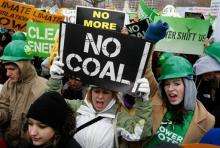Activists hold signs as they participate in a rally on the West Lawn of the US Capitol in March 2009 in Washington, DC. Meeting a widely-supported goal to tackle global warming means that humanity will be able to burn less than a quarter of the proven reserves of fossil fuels by 2050, a study released on Wednesday said.
Meeting a widely-supported goal to tackle global warming means that humanity will be able to burn less than a quarter of the proven reserves of fossil fuels by 2050, a study released on Wednesday said.
The paper, published by the British journal Nature, implies only a revolution in energy use can achieve the aim of limiting warming to less than two degrees Celsius (3.8 degrees Fahrenheit) above pre-industrial levels.
To achieve the objective -- embraced by the European Union (EU) and many scientists -- means that only 1,000 billion tonnes of carbon dioxide (CO2) can be emitted between 2000 and 2050, it said.
By comparison, the world has emitted a third of that amount in just nine years.
"If we continue burning fossil fuels as we do, we will have exhausted the carbon budget in merely 20 years, and global warming will go well beyond two degrees," said the study's lead author, Malte Meinshausen of the Potsdam Institute for Climate Impact Research in Berlin.
Fossil fuels -- coal, gas and oil -- provide the backbone of the world's energy supplies.
But they are also the main source of heat-trapping carbon gases blamed for warming Earth's atmosphere and driving changes to weather patterns.
Boosting efficient use of these fuels so that they are no longer dangerous or switching to cleaner alternatives carries an economic cost, and this is the biggest stumbling block in efforts to defuse the threat.
Meinshausen said the change should not be delayed and cautioned that even with a 2 C (3.8 F) warming, there would still be unprecedented risk.
"Only a fast switch away from fossil fuels will give us a reasonable chance to avoid considerable warming," he said in a press release.
"We shouldn't forget that a 2 C [3.8 F] global mean warming would take us far beyond the natural temperature variations that life on Earth has experienced since we humans have been around."
"To keep warming below 2 C [3.8 F], we cannot burn and emit the CO2 from more than a quarter of the economically recoverable fossil fuels up to 2050, and in the end, only a small fraction of all known fossil-fuel reserves," said co-author Bill Hare, also of the Potsdam Institute.
The study said world emissions of greenhouse gases have to be cut by more than 50 percent by 2050 levels compared to 1990 levels if the risk of busting the 2 C (3.6 F) ceiling is to be limited to 25 percent. In addition, reductions would have to be made from 2020.
The Group of Eight (G8) countries have pledged an emissions reduction of at least 50 percent by 2050.
But they have not identified a benchmark year against which this should be measured nor set an intermediate date by which emissions cuts should start.
Negotiations are underway under the UN's Framework Convention on Climate Change (UNFCCC) for agreeing on emissions cuts beyond 2012, when current pledges under the Kyoto Protocol expire. The UNFCCC wants to wrap up a deal in a conference in Copenhagen in December.
The world has already warmed by about 0.8 C (1.44 F) since the start of the Industrial Revolution, and another 0.5 C (O.9 F) or so is considered inevitable over coming decades given past greenhouse gas emissions.
(c) 2009 AFP























